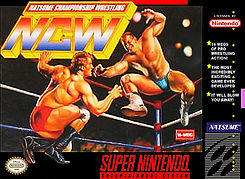| Natsume Championship Wrestling | |
|---|---|
 | |
| Developer(s) | Natsume Co., Ltd. [1] |
| Publisher(s) | Natsume Inc. [1] |
| Composer(s) | Iku Mizutani [2] Kinuyo Yamashita [2] Hiroyuki Iwatsuki [2] |
| Platform(s) | Super NES |
| Release | Super NES Wii Virtual Console Wii U Virtual Console Nintendo Switch
|
| Genre(s) | Action [1] Fighting [1] Wrestling [1] |
| Mode(s) | Single-player, multiplayer |
Natsume Championship Wrestling is a 1994 Super Nintendo Entertainment System video game that was released in North America.
This game is widely based on a conversion of Zen-Nippon Pro Wrestling Dash: Sekai Saikyō Tag (全日本プロレス’ 世界最強タッグ ダッシュ, Zen Nippon Puroresu Sekai Saikyō Taggu Dasshu; lit. "All Japan Pro Wrestling World's Strongest Tag Dash"), [3] [4] [5] a Japanese video game for the Super Famicom based on the All Japan Pro Wrestling promotion. Players must become either the Triple Crown Champion or the Triple Crown Tag Team Champions and achieve the limits of professional wrestling.
Natsume Championship Wrestling was added to the Nintendo Classics service in July 2020. [6]